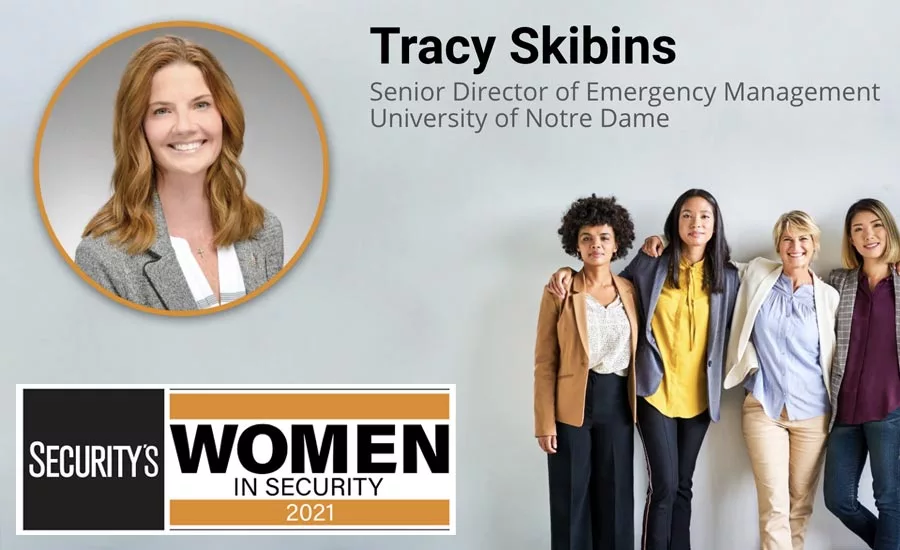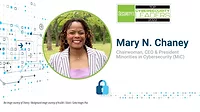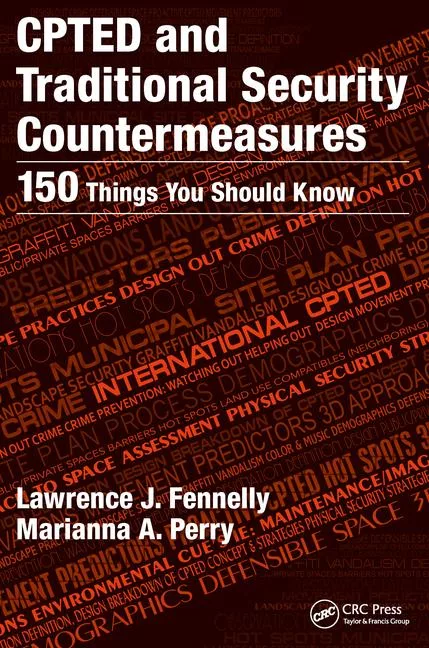Special Report // 2021 Women In Security
Preparation Through Experience and Perspective
Tracy Skibins, Senior Director of Emergency Management, University of Notre Dame

Bio Image courtesy of Skibins
Background image / Stígur Már Karlsson /Heimsmyndir / E+ / via Getty Images
Without a plan for her future, Tracy Skibins joined the Army Reserves out of high school to help pay for her college tuition. She became a military police officer and loved it. After college she joined the South Bend Police Department in Indiana working the night shift. Eventually, Skibins found herself as an investigator for the Special Victims Unit on domestic violence and child abuse. Throughout her career, she has become certified and/or an instructor in a number of specialties including Defensive Tactics, Fire Arms Training Simulator, Hostage/Crisis Negotiator, Rape Aggression Defense, and Crime Prevention through Environmental Design to name a few.
“I think my experience has made me a more well-rounded professional because you react the way you are trained and have the perspective of reacting effectively not if but when something bad happens,” she says.
When Skibins began working at the University of Notre Dame, she originally worked as a nightshift officer in order for her career to fit in with her family life. She then moved into the roles of training officer and Captain of Crime Prevention Outreach, before assuming her current position of Senior Director of Emergency Management, a leadership position at the university. She’s in charge of the strategic planning, implementation and management of Notre Dame’s overall response to all emergencies on campus. When the COVID-19 pandemic became a reality, Skibins was tasked with overseeing the university’s COVID-19 response unit, which has included contact-tracing, testing, quarantining and isolation efforts.
If you’ve found the pattern here, you see that throughout her career, Skibins has found meaning in educating and preparing others for emergencies as well as teaching them ways to safe, so it’s no surprise she found herself in a leadership position doing just that.
Part of Skibins’ success comes from her perspective of taking a proactive, holistic approach to security and risk assessments. “You can never prepare for everything, but identifying those risks to your organization and then preparing for as much as possible, can reduce or prevent disasters or crimes in the first place,” she shares.
Skibins has had a long career in conducting tabletop exercises and training sessions to prepare for response to emergency incidents, including conducting active shooter training exercises on Notre Dame’s campus involving the university’s police department, local municipalities, bomb teams, SWAT and crisis/hostage negotiators, all in the early 2000s before many agencies were conducting, or required to conduct, such exercises.
One of the critical aspects to preparing and educating others on potential emergencies or unknown events is communication with all relevant stakeholders, she says. “It’s important to make sure you have the right people included in the conversations. It’s also important to not be afraid to ask questions. It’s OK to get clarification to make sure you and they understand, no matter the role,” she says.
And a bumpy road during the process means you’re moving in the right direction. In other words, when it comes to managing for risk and preparing for emergencies, the planning process and the exercise process are critical to work out the rough edges. “Exercises aren’t supposed to go smoothly. You need to find the problems then and address them, so in the event of an actual emergency, you know what to do. Training is the time to make those mistakes,” she adds.
Despite the fact that Skibins has witnessed a fair share of emergencies, harrowing situations and violence during her career – or perhaps because of it — she has made it one of her missions in life to prepare others for unknown events, including her own children. And that, is the accomplishment she’s most proud of thus far. “I am proud of raising my children to become open-minded, good people, but also prepared and not scared,” she says.
As far as her advice for other women in the security industry, Skibins says don’t fall into the trap of thinking that just because your skills and experiences may not match a job description perfectly that you shouldn’t apply. “Have confidence that your life experience, as well as your job skills, mean something and a good organization should know this. Highlight yourself and make yourself shine,” she says.
Looking for a reprint of this article?
From high-res PDFs to custom plaques, order your copy today!







